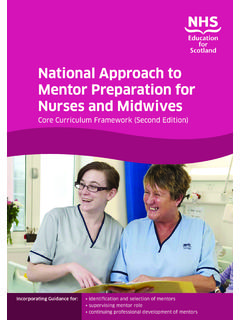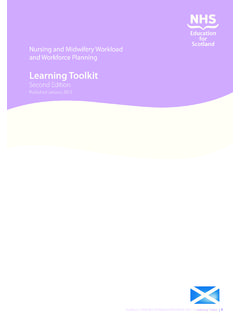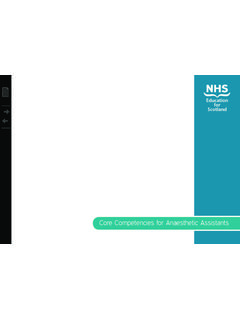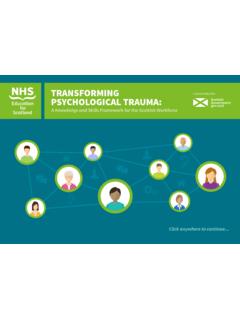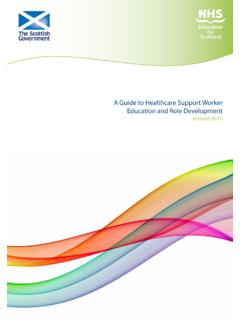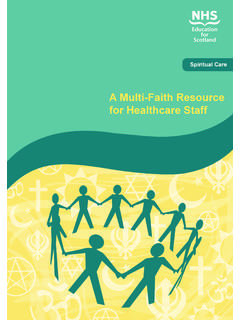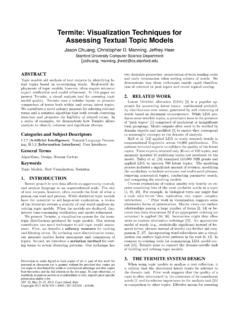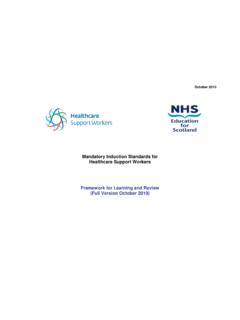Transcription of Think Capacity Think Consent - nes.scot.nhs.uk
1 Think Capacity Think Consent Supporting application of the Adults with Incapacity (Scotland) Act (2000) in Acute General HospitalsThink Capacity Think Consent2 Think Capacity Think ConsentThink Capacity Think ConsentThink Capacity Think ConsentThink Capacity Think Consent Supporting application of the Adults with Incapacity (Scotland) Act (2000) in Acute General HospitalsLearning Resource NHS Education for Scotland 2012. You can copy or reproduce the information in this document for use within NHSS cotland and for non-commercial educational purposes. Use of this document for commercial purposes is permitted only with the written permission of Capacity Think ConsentThink Capacity Think ConsentThink Capacity Think ConsentThink Capacity Think Consent3 ContentsIntroduction.
2 4 Learning Outcomes ..4 Consent to medical treatment while in hospital ..5 How the law in Scotland helps to safeguard people s rights and choices ..6 What is Capacity and Incapacity? ..7 Factors that may influence Capacity ..7 Proxy decision makers under the Adults with Incapacity (Scotland) Act (2000) ..10 Part 5 of the Adults with Incapacity Act - General Authority to Treat ..11 Assessment of Capacity under Part 5 of the Adults with Incapacity Act ..11 How will Incapacity be determined? ..12 Section 47 Certificate ..14 Summary Key Learning Points ..20 Appendices ..21 ContentsThink Capacity Think Consent4 Think Capacity Think ConsentThink Capacity Think ConsentThink Capacity Think ConsentLearning OutcomesOn completion of this learning resource you should understand: IntroductionAssessment of Capacity to Consent to treatment is an important legal and ethical issue for staff working in acute general hospitals.
3 It is estimated that between 30% and 52% of people admitted to hospital will lack Capacity to Consent to to Consent must always be assessed and incapacity should never be presumed because a person has a particular health condition or disability, for example mental health problems, learning disabilities, or proper legal authorisation the person s right to make decisions about their care can be violated. The Adults with Incapacity (Scotland) Act 2000 (AWI)1 places an obligation on all staff to understand legislation and apply it appropriately. This learning resource provides essential information about the application of Part 5 of the Adults with Incapacity (Scotland) Act 2000 (AWI) to ensure staff in acute general hospital settings safeguard the rights of people who lack Capacity to Consent to treatment.
4 This learning resource can be studied independently, in a group, or in a facilitated learning session. As well as providing you with key learning, scenarios are used to help encourage exploration and reflection about real practice powers and provisions of the Adults with Incapacity (Scotland) Act 2000 (AWI) in relation to Capacity and Consent to assessment of Capacity and incapacity to Consent to application of the principles and powers of the AWI Act to your Scottish Executive (2000) The Adults with Incapacity (Scotland) Act. Edinburgh: The Scottish Executive [online] Available: Think Capacity Think ConsentThink Capacity Think ConsentThink Capacity Think ConsentThink Capacity Think Consent5 Consent to medical treatment while in hospitalIn this section we discuss Capacity in relation to Consent to medical treatment is defined as any procedure or treatment designed to safeguard physical or mental health.
5 Therefore it includes fundamental aspects of care such as nutrition and hygiene as well as specific treatments for illnesses or treatment against the wishes of a patient capable of consenting to treatment violates the principle of patient autonomy and can constitute assault. Autonomy requires the Capacity to Think and make decisions consistent with one s own values and the ability to act freely without undue influence from have a fundamental right to determine what happens to their own bodies, and healthcare professionals must respect that right. Therefore people must give valid Consent to all forms of healthcare whether this is personal care or major surgery.
6 This right to self-determination in a capable adult extends to refusing to undergo any medical intervention, even where this may result in harm or even death. In an emergency situation, healthcare professionals may provide treatment to patients without Consent , provided that the treatment is necessary to preserve life or to prevent a serious deterioration in their condition. Accurate and detailed recording of both the decision and the decision-making process is Capacity Think Consent6 Think Capacity Think ConsentThink Capacity Think ConsentThink Capacity Think ConsentHow the law in Scotland helps to safeguard people s rights and choicesThe law in Scotland presumes all adults 16 years and older have sufficient Capacity to decide on their own medical treatment.
7 This presumption of Capacity can only be overturned on evidence of impaired Capacity , even where the person has a diagnosis that may affect his or her ability to make decisions, for example dementia. In Scotland the main piece of legislation used to protect the rights of a person who lacks Capacity to Consent to treatment is Part 5 of the Adults with Incapacity (Scotland) Act (2000).The Adults with Incapacity (Scotland) Act (2000); (AWI), created a legal framework for making decisions on behalf of a person who does not have the Capacity to make decisions. It covers the person s welfare, property, financial affairs and medical treatment.
8 It also enables a person to make their own arrangements about how their affairs should be managed in the future if they lose the Capacity to make Scottish Executive (2003) Mental Health (Care and Treatment) (Scotland) Act. Edinburgh: The Scottish Executive [online]. Available: Scottish Government (2007) The Adult Support and Protection (Scotland) Act. Edinburgh: The Scottish Government [online] Available: Scottish Government (2010) Equality Act. Edinburgh: The Scottish Government: [online] Available: significant feature of the Act is the introduction of proxy decision makers which we will describe in more detail later in the learning resource.
9 Prior to this legislation, under common law, no other person could Consent to treatment on behalf of another Mental Health (Care and Treatment) (Scotland) Act (2003)2, Adult Support and Protection (Scotland) Act (2007)3 and the Adults with Incapacity (Scotland) Act (2000) are often referred to as a suite of adult protection legislation. All set out clear statements of Principles that inform the ethical basis for the provisions of the legislation and the values underpinning it. All three Acts share many of the same principles described in Appendix 1, and place a duty on the person or bodies intervening to have regard for the principles which may be the subject of judicial review.
10 These are underpinned and supported by the Human Rights Act (1998) and the Equality Act (2010) Capacity Think ConsentThink Capacity Think ConsentThink Capacity Think ConsentThink Capacity Think Consent7 The Principles of the Adults with Incapacity (Scotland) Act (2000) Any intervention under the Act must take account of the principles and must be followed in any action taken. If not, the action may be subject to legal challenge. The principles are as follows: Account should be taken of the views of specific persons such as guardian, attorney, relatives and any other person appearing to have an interest in the person. Anyone acting under the act must encourage the adult to develop and exercise as much skill as possible in making decisions or taking actions.
